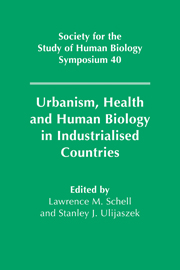Book contents
- Frontmatter
- Contents
- List of contributors
- Part I The urban environment
- 1 Urbanism, urbanisation, health and human biology: an introduction
- 2 Urbanisation and urbanism in industrialised nations, 1850–present: implications for health
- 3 Urban development and change: present patterns and future prospects
- 4 Transitional environments: health and the perception of permanence in urban micro-environments
- Part II Epidemiology
- Part III Poverty and health
- Part IV Behavior and stress
- Part V The future
- Index
4 - Transitional environments: health and the perception of permanence in urban micro-environments
Published online by Cambridge University Press: 06 January 2010
- Frontmatter
- Contents
- List of contributors
- Part I The urban environment
- 1 Urbanism, urbanisation, health and human biology: an introduction
- 2 Urbanisation and urbanism in industrialised nations, 1850–present: implications for health
- 3 Urban development and change: present patterns and future prospects
- 4 Transitional environments: health and the perception of permanence in urban micro-environments
- Part II Epidemiology
- Part III Poverty and health
- Part IV Behavior and stress
- Part V The future
- Index
Summary
Editors' introduction
This chapter, and the one preceding it, by Clark, address the issue of diversity and character of “urban” places. Trailer parks, which Huss-Ashmore and Behrman term “permanently transitional communities,” defy classification in common categories of urban places, demonstrating Clark's point about the uselessness of simple categories for either description or analysis. The macrolevel perspective provided by Clark is complemented by the microlevel approach taken here. The analysis works on several levels. Like Clark, Huss-Ashmore and Behrman address the issue of what an urban place is, by examining the culture, environment and biology of residents of trailer parks. The approach is remarkably similar to that used in adaptability studies which were usually conducted with remote and isolated communities and sought to understand how the biological and cultural systems worked adaptively. A key theoretic and methodological problem for such studies has been defining the boundaries of the study population. Today more then ever before, communities are linked to larger networks through economic relations. In an urban world where boundaries are often indistinct, the authors are able to define a community for intense, ethnographic and human biologic study. Ironically, the community defined in this chapter is characterised by an ideology of transition, although residence in trailer parks may be long-term and anything but transient.
- Type
- Chapter
- Information
- Publisher: Cambridge University PressPrint publication year: 1999
- 1
- Cited by



